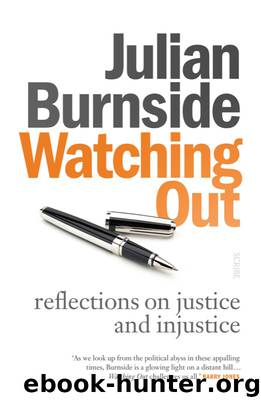Watching Out by Julian Burnside

Author:Julian Burnside
Language: eng
Format: epub
Tags: LAW052000, LAW060000, LAW013000, LAW026000
Publisher: Scribe Publications
Published: 2017-07-31T04:00:00+00:00
-10-
Petrol prices
All motorists in Australia are familiar with the petrol-price cycle: the advertised price of petrol at service stations edges downwards across the course of a week or two, and then it jumps back to where it started. Picking the right time to fill up is an engaging diversion, given that the difference between the bottom of the market and the top can be as great as 10 per cent or 15 per cent. And the need to pick the right time to fill up is compounded by the fact that, when the price at one service station jumps, so does the price at practically every other service station.
It is as if service station operators can read each other’s minds. Or is it more than that?
For some time, the Australian Competition and Consumer Commission (ACCC) had been watching the petrol-price cycle in Ballarat, a regional city in Victoria with a population of around 90,000. It formed the view that various service stations in Ballarat had been coordinating their petrol prices from 1999 to 2001. The Trade Practices Act (since subsumed into the Australian Competition and Consumer Act) prohibited making or giving effect to an arrangement which had the purpose, or would have or be likely to have the effect, of substantially lessening competition. The ACCC thought that some service stations in Ballarat were parties to a price-fixing arrangement.
The ACCC has very wide powers to gather information. They got hold of telephone records of the various service stations, and they had a record of the daily price movements of petrol in Ballarat. They called in employees of the Ballarat petrol retailers to give evidence. (This procedure — the section 155 examination procedure — is a significant part of the ACCC’s effectiveness. The ACCC has the power to require a person to give evidence, on oath, at the ACCC’s premises for the purpose of finding out what has been going on. The interrogations are held in private, and the witnesses are prohibited from speaking to other people about what questions they were asked and what answers they gave.)
In preparation for the section 155 examinations, the ACCC had assembled all the telephone records and the petrol-price information in a special form. For each day when prices jumped, there was a set of Powerpoint slides that showed phone calls between the retailers, and the precise times of those calls. And the slides also showed when the various retailers increased their prices. Going through the slides for any given price-rise day, what emerged was a series of phone calls from retailer1 to 2 to 3 to 4, and so on, followed quickly by price rises at retailer 1, 2, 3, 4, and so on.
The retailers gave evidence during the section 155 procedure. They generally said that they knew the names of the other retailers, but never spoke to them and never had occasion to speak to them. Then they would be shown the slides. And then they made up excuses that were, for the most part, patently untrue.
Download
This site does not store any files on its server. We only index and link to content provided by other sites. Please contact the content providers to delete copyright contents if any and email us, we'll remove relevant links or contents immediately.
The Borden Murders by Sarah Miller(4325)
The Secret Barrister by The Secret Barrister(3710)
Police Exams Prep 2018-2019 by Kaplan Test Prep(2549)
Coroner's Journal by Louis Cataldie(2479)
The Splendid and the Vile by Erik Larson(2474)
Terrorist Cop by Mordecai Dzikansky & ROBERT SLATER(2080)
A Colony in a Nation by Chris Hayes(1935)
My Dark Places by James Ellroy(1931)
The Art of Flight by unknow(1878)
Black Klansman by Ron Stallworth(1796)
Objection! by Nancy Grace(1786)
A Life of Crime by Harry Ognall(1731)
The New Jim Crow by Michelle Alexander(1702)
Anatomy of Injustice by Raymond Bonner(1670)
American Prison by Shane Bauer(1660)
Invisible Women by Caroline Criado Perez;(1642)
Whoever Fights Monsters by Robert K. Ressler(1618)
Obsession (The Volkov Mafia Series Book 1) by S.E Foster(1580)
A is for Arsenic: The Poisons of Agatha Christie (Bloomsbury Sigma) by Kathryn Harkup(1549)
